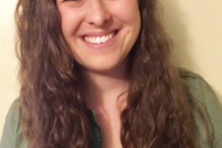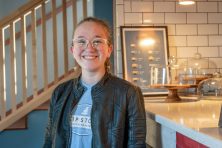Technology and Religion with Meghan O’Gieblyn
- Share
- Tweet
- Pin
- Share

The Washington Island Literary Festival returns for the 11th year on Sept. 21-23. This year’s presenting authors – Amy Quan Barry, Brenda Cárdenas, Lan Samantha Chang, Meghan O’Gieblyn and Shelby Van Pelt – will host talks and workshops surrounding the 2023 theme, “Space for the Unexpected.”
The festival kicks off with a free community creative lab on Sept. 21, 12-3 pm; author workshops will take place Sept. 22, with an evening reception at the Farm Museum; and the authors will have talks, a panel discussion and signings to close the festival on Sept. 23. Visit writeondoorcounty.org to get more details and register.
Presenter O’Gieblyn is an author, essayist and columnist for places such as The New Yorker, The New York Times and WIRED, among others. She is the recipient of three Pushcart Prizes and the 2023 Benjamin H. Danks Award from the American Academy of Arts and Letters.
Her first book, Interior States, won the 2018 Believer Book Award for nonfiction, and her most recent book, God, Human, Animal, Machine: Technology, Metaphor and the Search for Meaning, was published by Doubleday in 2021.
In a recent episode of the Door County Pulse Podcast, I talked with O’Gieblyn about her recent book, how she ended up writing about religion and technology, the current state of AI technologies, and how her work fits into the theme of this year’s festival. The interview has been edited for length and clarity.
Listen to O’Gieblyn on the Door County Pulse Podcast- https://doorcountypulse.com/podcast-technology-and-religion-with-meghan-ogieblyn/
Grace Johnson (GJ): Can you tell our listeners a little bit about yourself and how you ended up writing about religion and technology?
Meghan O’Gieblyn (MO): It really grew out of my personal experience. I grew up in a very religious home. My family and my parents were fundamentalist Christians. We didn’t use that exact terminology when I was growing up, but we believed that the Bible was the word of God, and that Christ was going to return eminently.
I actually studied theology in college. I went to a small bible school called Moody Bible Institute in Chicago. I wanted to be a missionary when I was young. But I ended up actually having a faith crisis during my second year and I left the school.
I sort of lost my faith over the period of years following that, and I was writing throughout that time. I was writing a little bit of fiction and journaling a lot about that whole process and reading a lot of philosophy and I got into technology.
GJ: I was curious what the process is like for writing something like this, something that contains a great deal of research that’s conceptualized or understood through your own personal experiences and anecdotes.
MO: It was tough. I mean this is the first book that I’ve written that was one sustained topic. My first book was a collection of essays, and I really consider myself an essayist at heart. It was a lot of trial and error.
The other thing that surprised me during the process is that initially, I didn’t think I was going to use that much of my personal experience in the book. I started this project at a time when I was feeling very ambivalent about being a first-person writer and relying on my experience so much. I felt like it was oftentimes a distraction from the topic.
Once I was willing to put more of myself into the book and talk more about what these ideas really meant to me, that was really when the idea started to take off and I felt like I was able to get some more energy around the process.
GJ: You are one of the featured authors at the Washington Island Literary Festival. This year, the theme for the festival is “space for the unexpected.” How do you see your work fitting into that theme?
MO: I guess the obvious answer is that technology is really a place of the unexpected, especially the technology that we’re developing right now. I think one of the most frightening things about AI [artificial intelligence], is that it’s really unpredictable. When we have a machine learning-process system that’s learning on its own through trial and error, it can develop weird emergent features – it can develop skills that weren’t programmed into it.
I’m really interested in the way in which that process is mirrored in the creative process. When you start working on a project you don’t know what’s going to emerge. It’s a complex system. Language is a complex system, so there’s really no way to totally determine what’s going to come out in advance.



